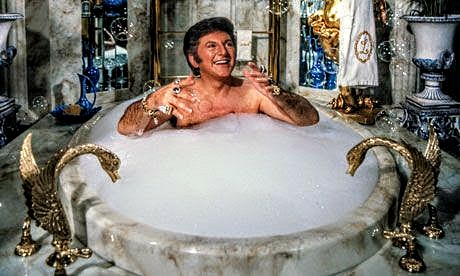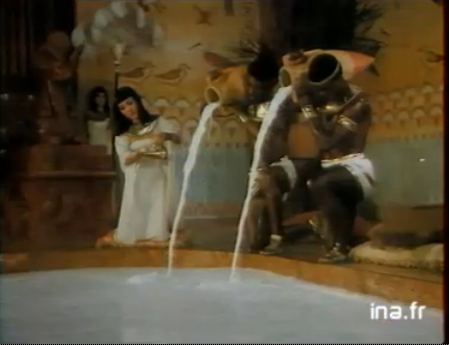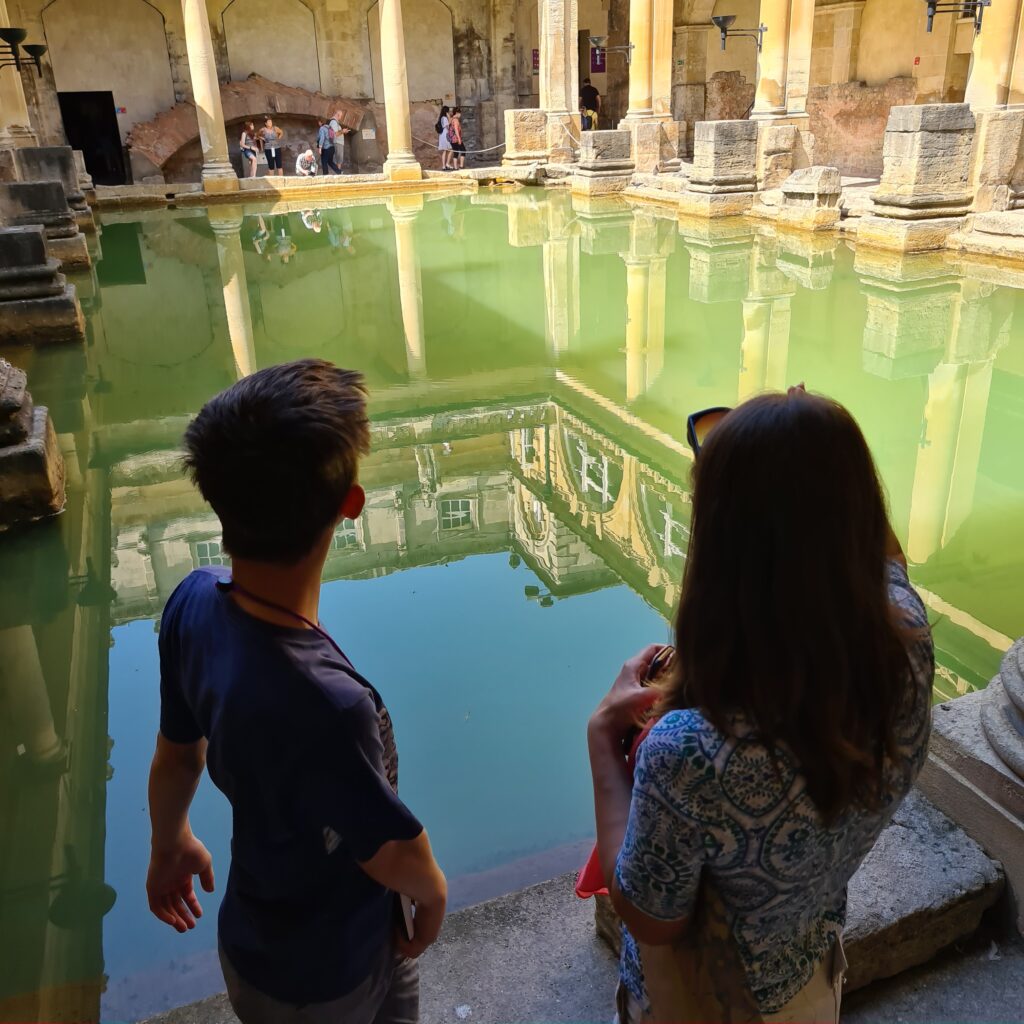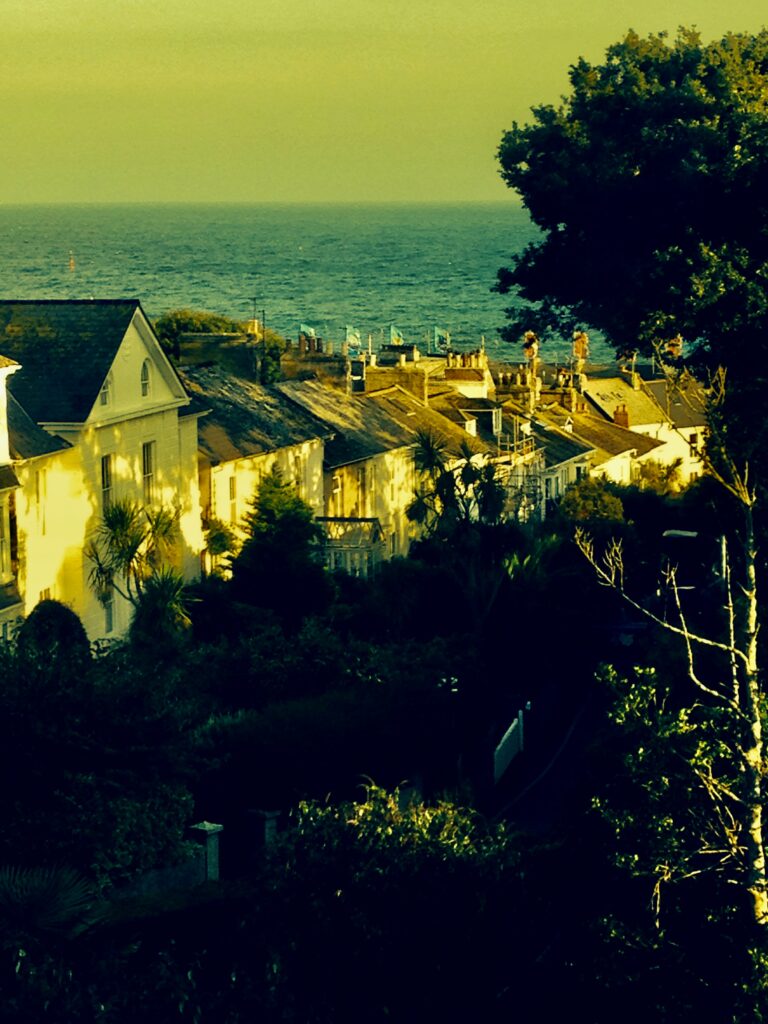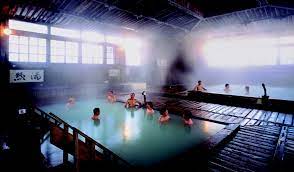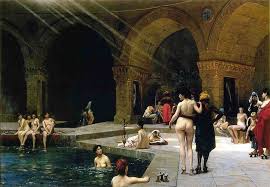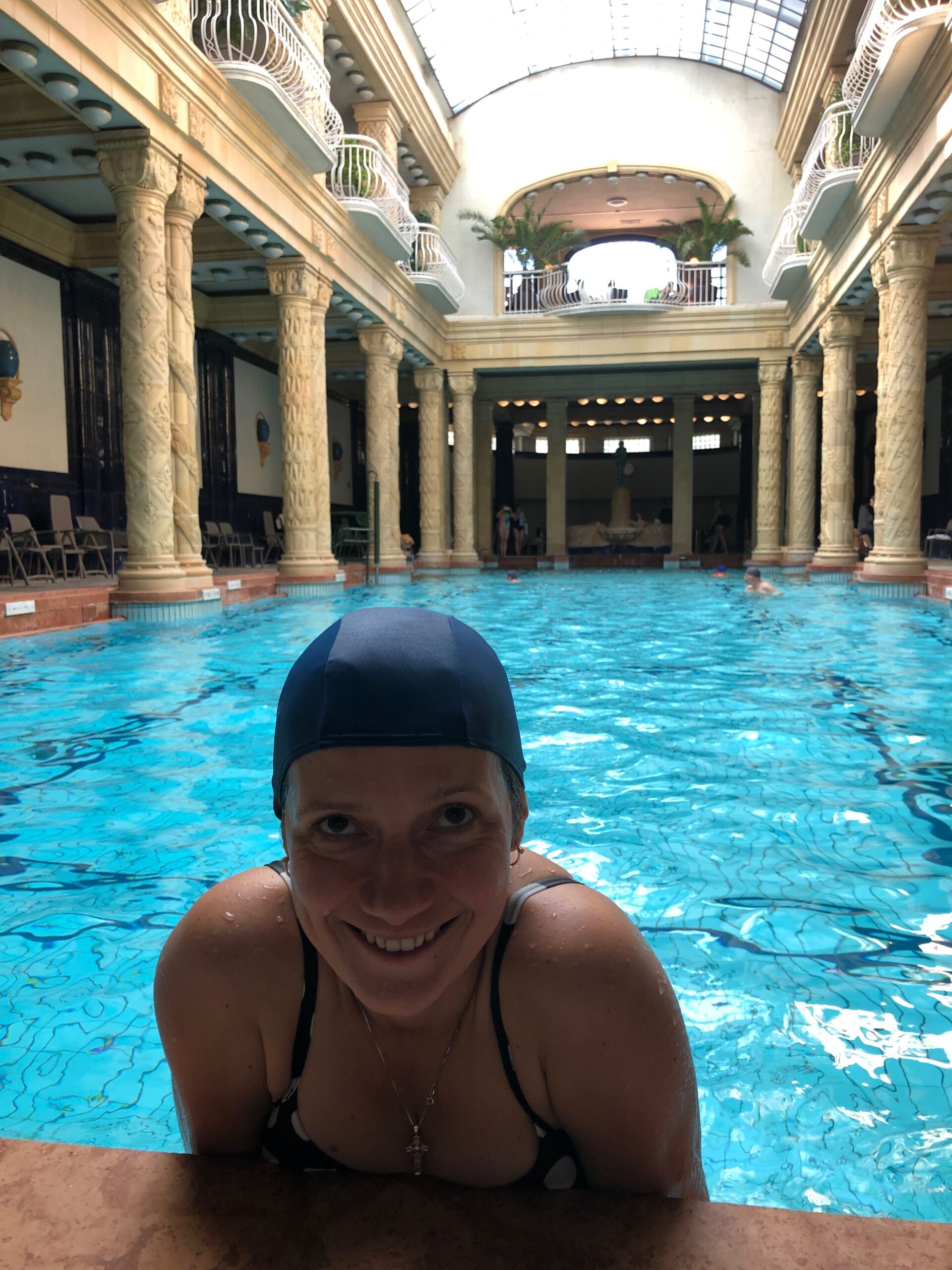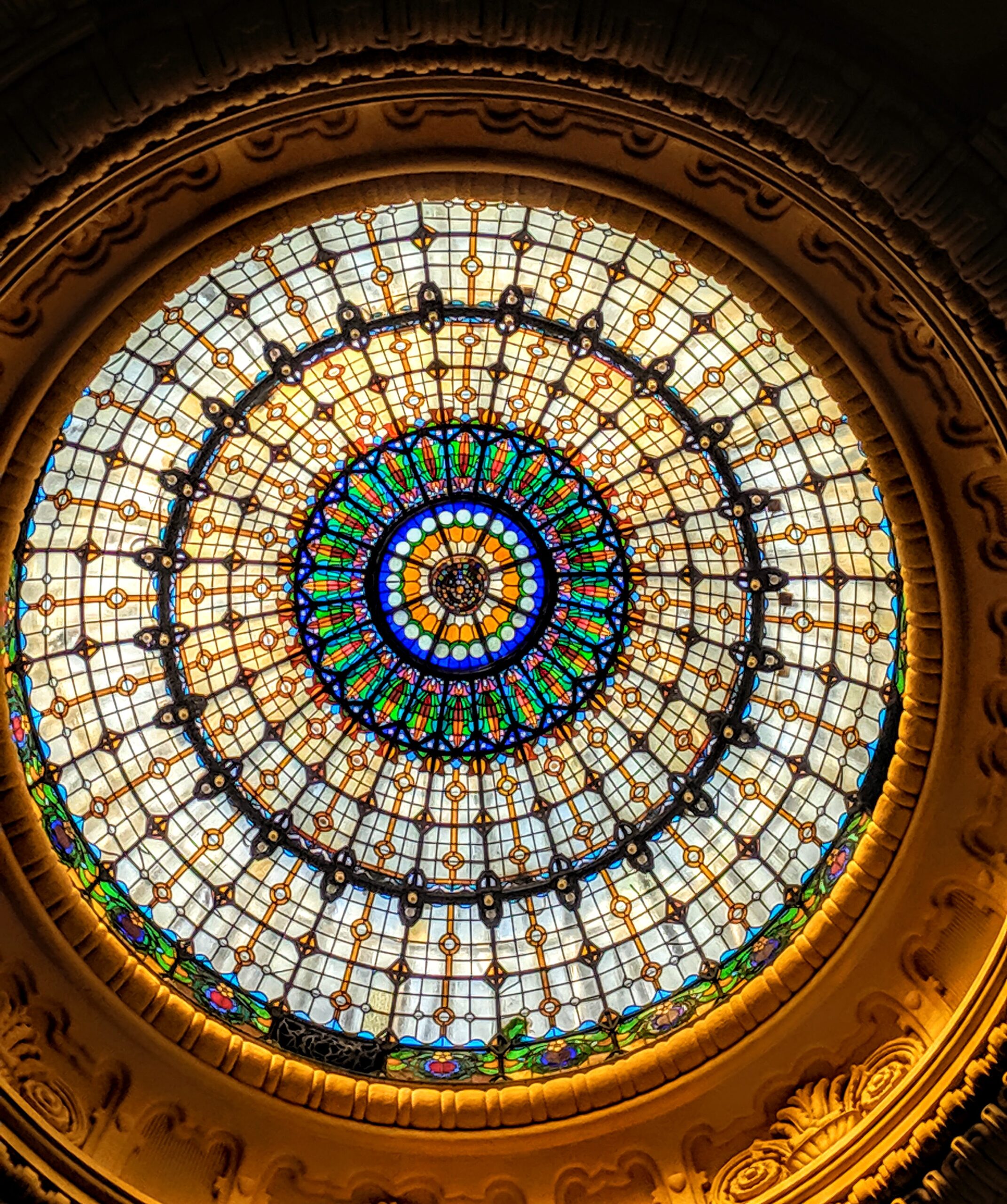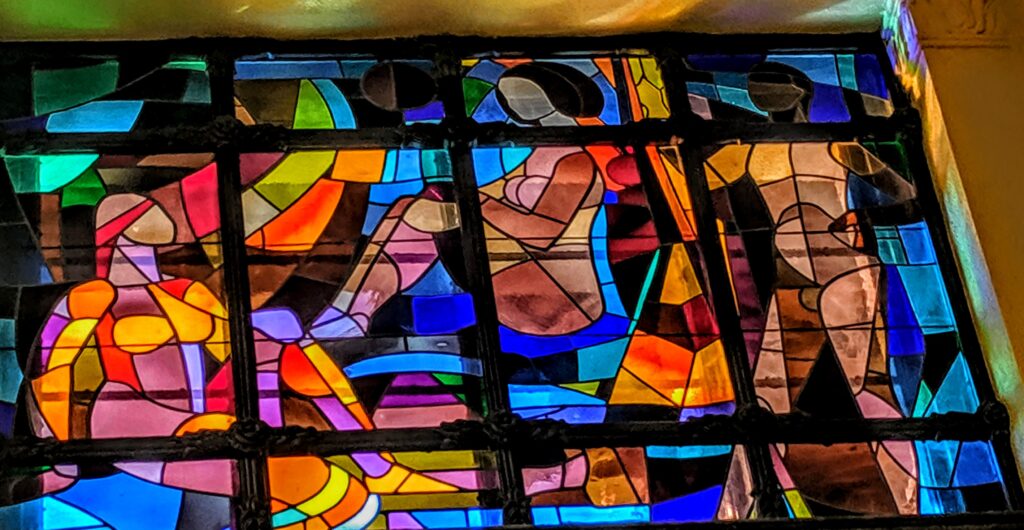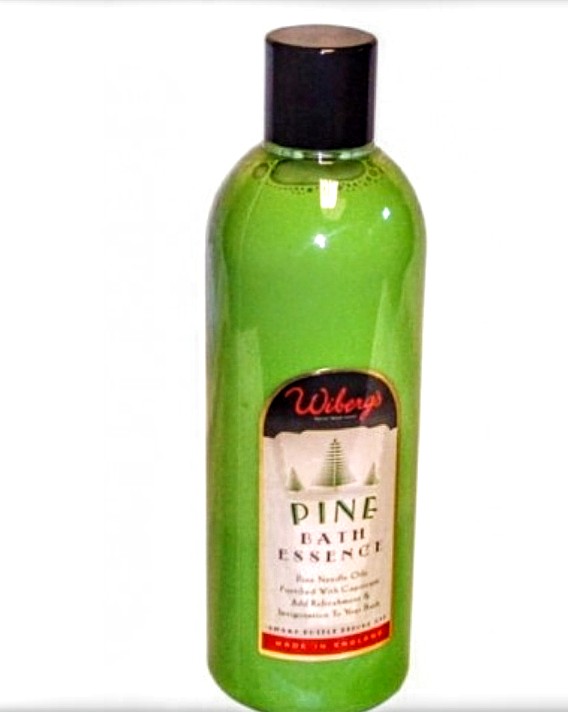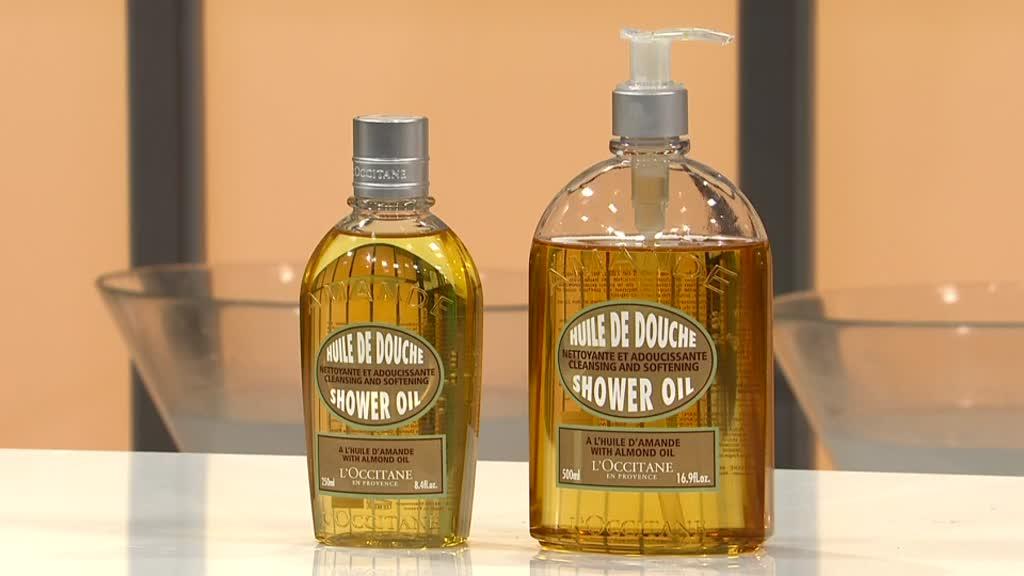What I want to know is, when did it become “eccentric” to have a bath? The perpetrator of this odd observation was a preening executive at a large fashion retailer. We were running an offsite meeting for the board to help them formulate their next eighteen month strategy. Day two started with “Shower reflections” as a way to get any overnight thoughts from the team on the content from day one. (It’s often helpful to add perspective and the space between the two days buys time to process and involve the slower, right hand creative side of the brain. Which gives richer and more thoughtful reflection and so moves the debate to a higher level. You’re welcome.) Okay. It’s called “shower reflections” because showers are the preferred method of washing for a lot of people. But I have always preferred lying down in a tub of water to standing up in a drip of rain. Thoughts – and silent nothingness – come to me easier when prone, it seems. So when I struck a blow for the bathers amongst us to come out and commented “let’s not be exclusive – if you had a bath this morning, we also want to hear your thoughts”, I expected a few heads to nod in gratitude that someone had welcomed them in. Nods there were none. Just the preening woman at the head of the table saying “well, you would have a bath, you’re eccentric”. That was me labelled.
What happened? The bath has been the cultural high watermark of all civilisations. From Cleopatra in her asses’ milk splendour through the famed Roman baths spread all over that ancient empire to the Ottoman Hammam, the Russian Banya, the Swedish sauna, the Japanese Sentõ and the humble bath tub at home, bathing has been the central commonality of the great civilisations. It is where hygiene was introduced. And hygiene made everything else possible: better hygiene, less disease; less disease, more time to talk, flirt, do business, plot, scheme, make friends, enjoy life. Bathing is the bedrock of stable society. A society that bathes together, bonds. Ask any boarding school survivor.
Every civilisation worth the name has discovered its own way to bath. My Russian family love nothing more than to get down to the local banya, stoke up the fire, dampen the birch leaves and waft the scorching air around your skin until your bones melt. When the body can’t take it any more, you plunge into the icy water – preferably a hole in the nearest icy-covered river – and watch the steam rise. Or, for the really hardy, dance around outside and rub your body down with handfuls of snow. It is heaven. After a few more turns, everyone retires to the common area and enjoys a beer in the warmth away from the cold outside. The banya, following the tradition of its cousins, the hammam and the Roman bath, is a place where you can hide nothing. It is a place of friendship where talk can be frank as well as fun. A place of comradeship where people go to talk, their guard – and their garments – down.
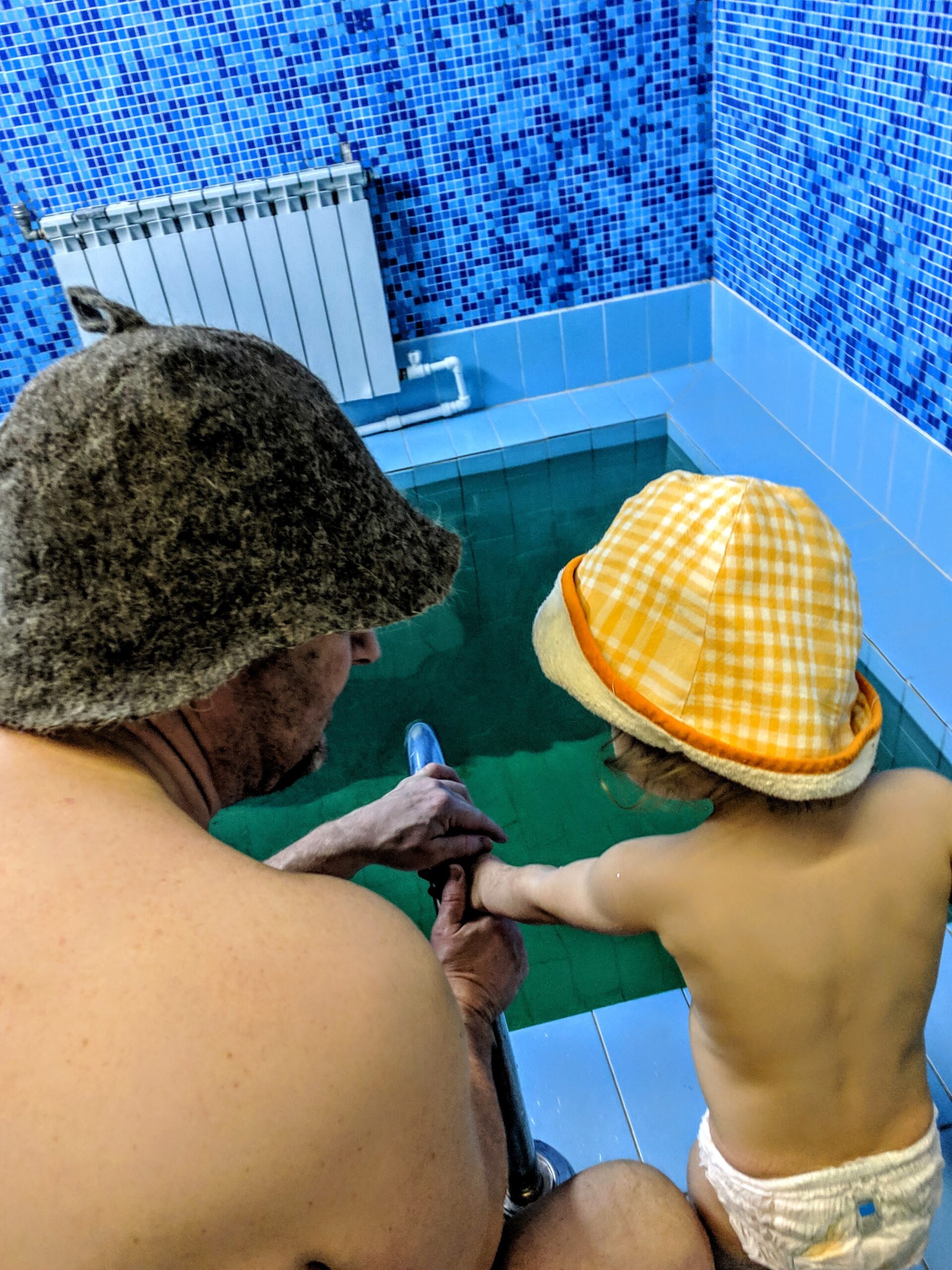
My daughter being inducted into the ways of the banya 
Birch twigs waft the scalding air into your aching bones 
Timur stokes the furnace 
I rub snow into my body in the middle of a Russian winter 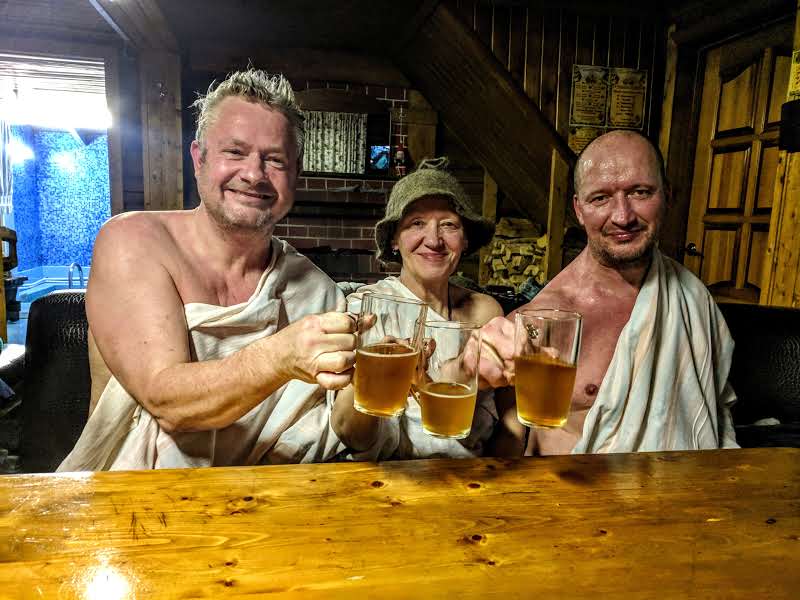
Time for talking
In two weeks time, we are moving home to an apartment that does not have a bath. I have only ever lived without a bath once before, for six months in a garret in Meribel in the French Alps. That was force majeure. The ski company I was working for was nip-nosed with its accommodation for staff, even for me, their resort manager. The accommodation was in the attic of a stone house on the road out of town. There was the main room, with a microwave and a fridge (that was the kitchen) and a shower just off the main room (that was the salle de bain, sans bain). The shower was a porcelain base, a temperature and pressure control (didn’t work), and a handheld shower head from which dribbled the sort of stream you’d be immensely grateful for after three days trekking in the Gobi Desert. But after twelve hours cooking, cleaning, skiing and doing the chalet rounds to glad hand it with 80 guests feels as appropriate a reward as a 1% pay offer for nurses after all their efforts during the pandemic. The whole ensemble was encircled by a flimsy polythene shower curtain which, sucked in by the measly water pressure, clung to the nearest solid surface (me) with an icy grip. This daily tussel with a cold, wet suffocating shroud has not endeared me to showering.
Yes. I know. There are power showers and those ones you get in boutique hotel rooms, all chrome and black slate with glass screens and shower heads the size of Mercedes Benz 16 inch alloy hub caps. With the water pressure of a New York water hydrant.
I never get them.
I get British showers. Whatever the promise, however magnificent the equipment might look, the important bit, the coverage per acre – or however they measure water output efficiency in the bathroom accessories and fittings category – is always woeful. I fiddle with the dials and taps and anything that moves and still, all that emerges is a sporadically boiling, usually ice cold drip which barely moistens the palm of my hand.
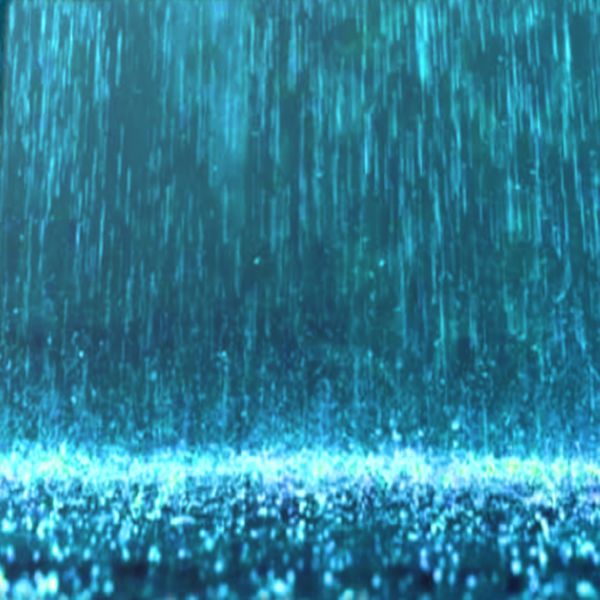
Shower of rain – the theory 
Dripping shower – the practice
You can imagine how I look forward to the next two years without a bath.
There is sheer joy to be had from a bath filled to the brim. Greenish water, bubbled with Badedas (‘Things happen after a Badedas bath‘ – remember that advertising line from the 1970s?). Or almond oil, or seaweed serum – any unction of anointment which covers me, head to toe, in balm. Drifting off in a haze of relaxation, half asleep and sometimes dozing. Topping up the water with scalding new torrents or cooling me down with cold on a hot summer’s eve. The bath, to me, is a pilgrimage to peace. A haven of alone time. A sanctuary from troubles. The watery pool where I can reside away from the world and cares. And, of course, a place of play – grown up play with the rituals of washing and caress or innocent play with my daughter and her ducks. It is a place of infinite joy.

Ducks 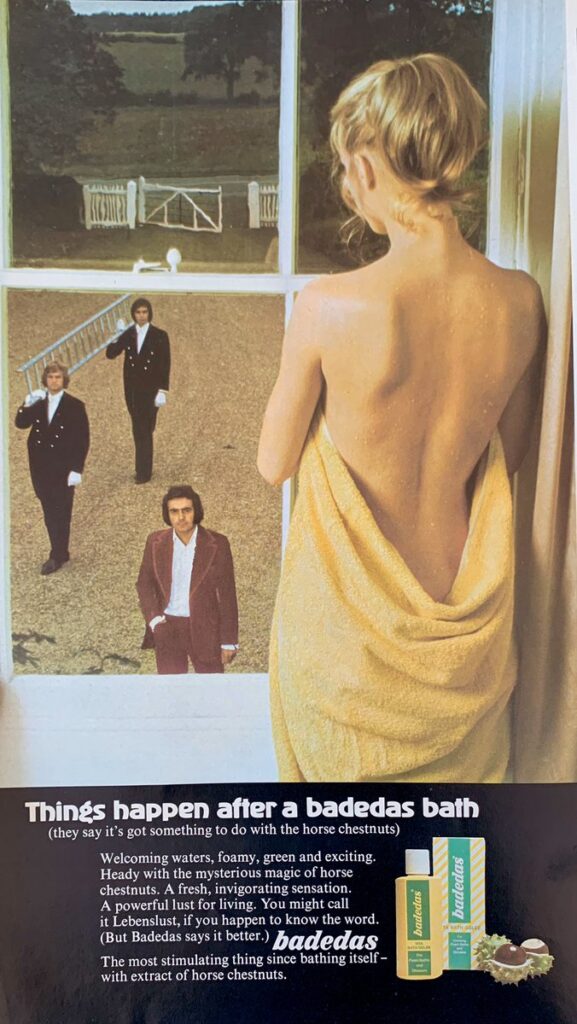
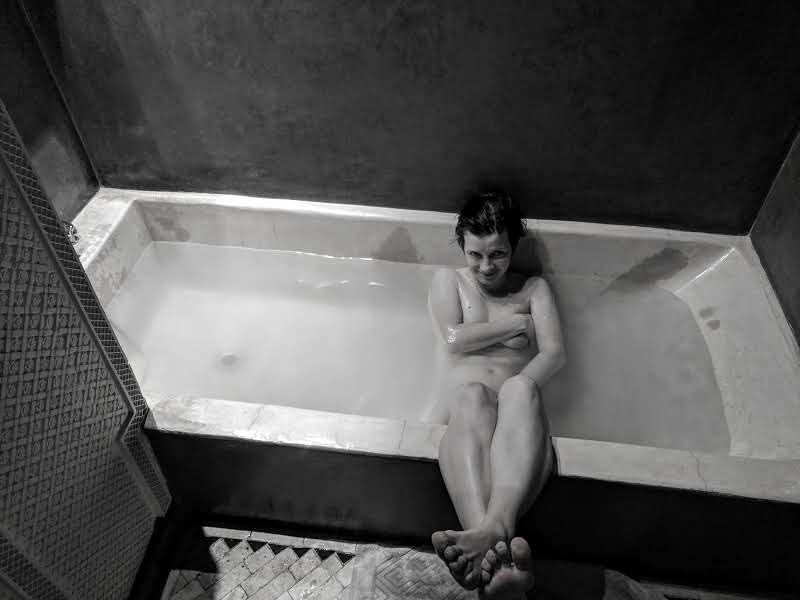
Rhymes with ducks
In the 1970s, when I was growing up, my household and the entire nation, seems to have taken leave of its senses. A rash of pink porcelain or avocado ensuites swept the land. Liberated from the “do you want this in white or white?” strictures of the post war period, where just having a bath in the house was an untold luxury, the country went crazy for colour. Skip-fulls of thrown out baths later and those of us with better taste have dispensed with these colourful cousins of real baths – I had to suffer an avocado suite in my Penzance flat for five years, but Penaznce is a time warp itself, so that was part of the charm. However, when I choose a place to live, the bathroom and the bath in particular is the primary place of interest. If it has a cork floor or those large black and white checks on the floor, or if the floor is made of wood, we’re in business. If the bath is an enamel, claw-footed affair with a lip, doubly so.
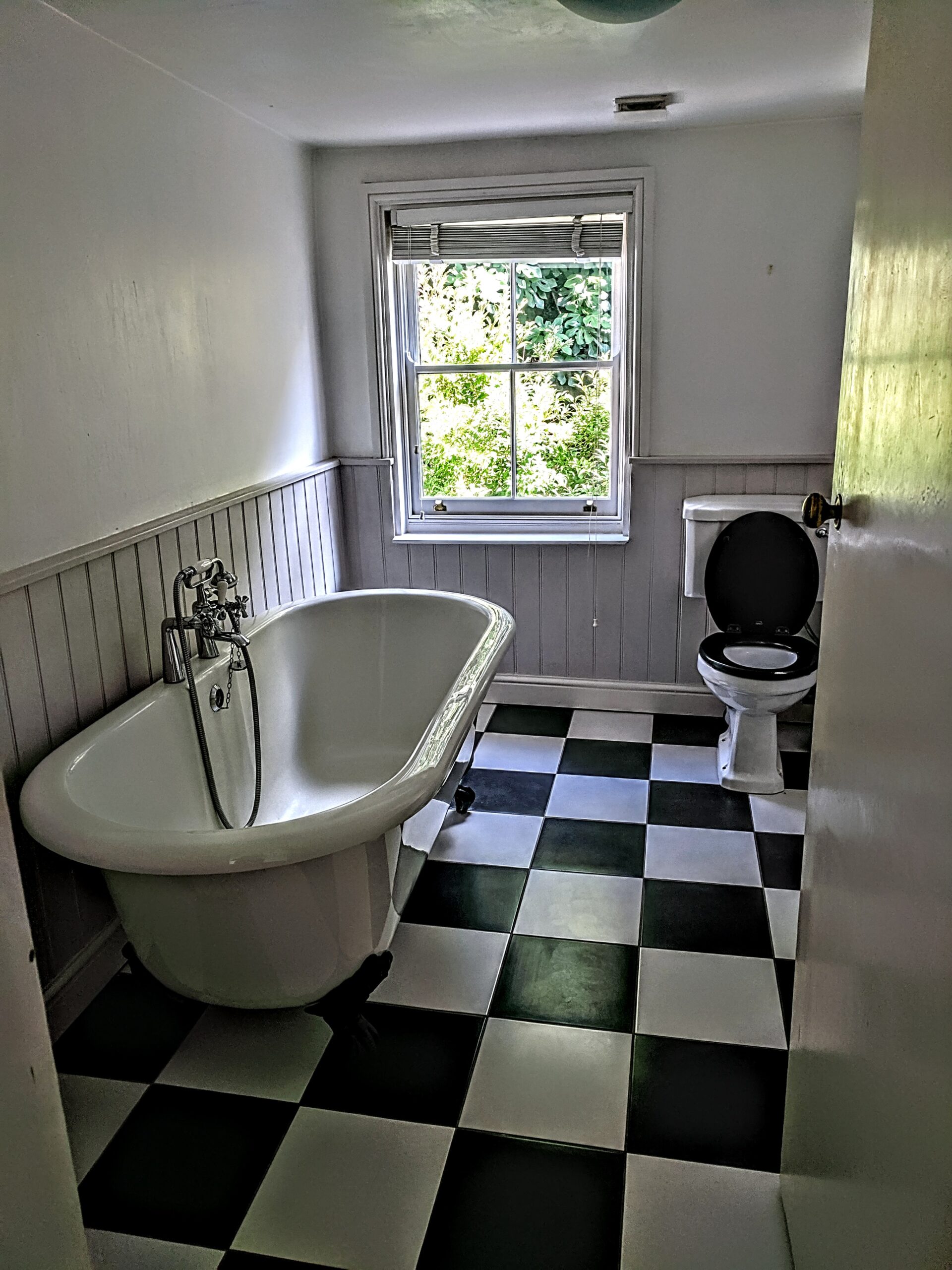
Classic 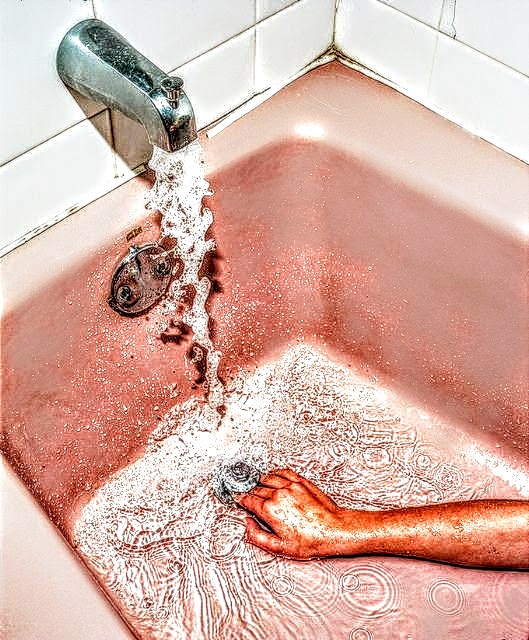
1970s
Only once in my life have I actually designed a bathroom from scratch. In the house in Cornwall. It was on the third storey and the window looked across the bay to the Penlee lifeboat station. Lying in the bath I could see Regency houses and green trees giving way to the sea and across to the red door of the forever closed lifeboat house. The station is on a little promontory jutting out above the water and is now a permanent memorial to the crew who answered the call on 19 December 1981. They never came back. Any of them. On the last day I occupied that house before quitting it, I ran one final bath and soaked myself, just for the experience of enjoying the bathroom I had created and to savour that magnificent, if melancholy, view.
Bathing is luxurious. My son used to come and stay and enjoy a full bath. When he was staying at his mum’s, she only allowed him six inches of water in the bath because she was economising. I impose no such limit on one of the great pleasures of civilised existence. Bathing may not be entirely free, but since the days of Cleopatra’s asses’ milk ablutions, it has an image in excess of the wealth needed to sustain the hobby. Baths are good value. Though, I fear and suspect, they will be frowned upon increasingly as luxuries the planet cannot afford by the green puritans who increasingly hold sway. I am glad to have been in a generation where we have been left alone to enjoy bathing and baths. Showers may be more environmentally friendly, but for all their green credentials, they miss the indulgence of a proper soak. They are efficient but charmless.

There is one bath I long to experience. The Japanese communal bath – Sentō. There is a strict etiquette to these often mixed bathing houses. One must be scrupulously clean before climbing in to share the warm water. Which involves washing in a shower thoroughly. A shower with the purpose of getting into a bath makes sense to me. I am happy to adopt such a practice. What could be better than to ritualise the act of bathing? I should have been born Japanese. Are they eccentric? There are 120 million of them. So it’s difficult to see how an entire nation could be seen as such. Doubtless the preening executive would say they are. As in so many things, the Japanese have shown us a better way of living. My next pilgrimage will be to Japan and when I go, my journey will start in a Sentō house.
Bathing is something I seek out in my travels. In Istanbul, naturally, the hammam calls. I have been twice to be soap sudded and vigorously rubbed down by a very hairy Turkish man. They twist and bend your limbs into shapes they shouldn’t. The torture is eye watering but lovely when it stops. And the scooping of cool water from the marble basins, heavenly – if it is not sacreligious to say so. In this room, where the Kaiser, Wilhelm II, preferred to take his Turkish Bath, all men are equal. Wrapped only in a small cotton towel, dignity and rank are discarded.
Perhaps the bath capital of the world is Budapest. When we visited in 2019, we opted for the Gellert Baths because it is a beautiful art nouveau original and the pools are worn with time and burnished with charm. The Gellert is opposite the famous Chain Bridge on the Buda side of the Danube. It is a temple to the beauty of water when combined with glass, steel, copper, marble and ceramic. There are very hot pools, warm and cool pools, inside and out, so it doesn’t get too crammed, and we enjoyed half a day flitting between the two. My, we were clean and we emerged feeling marvellous. There are no shower cities, are there? I wonder why.
I like my baths scaldingly hot. And I like the paraphernalia of bath time. My bath is like Getafix the druid’s caldron in the Asterix books – full of magic potions: pine or verbena bath oil; seaweed and arnica shampoo; coconut conditioner; Dead Sea bath salts; almond soap. A drop of this, a few crystals of that. Like a witches brew, they revive, relax, invigorate and sedate. When I emerge, I am a cornucopia of scents. Baths are an indulgence of the senses and a transport for the mind. Taken in fresh air or with windows wide open so the steam rises and floats off your limbs like a ghostly spirit, a bath is a link with the history of humanity and with all civilisation. There is nothing eccentric about it. I shall miss my bath time tremendously these next two years. But, like a hippo to his watering hole, I will return.
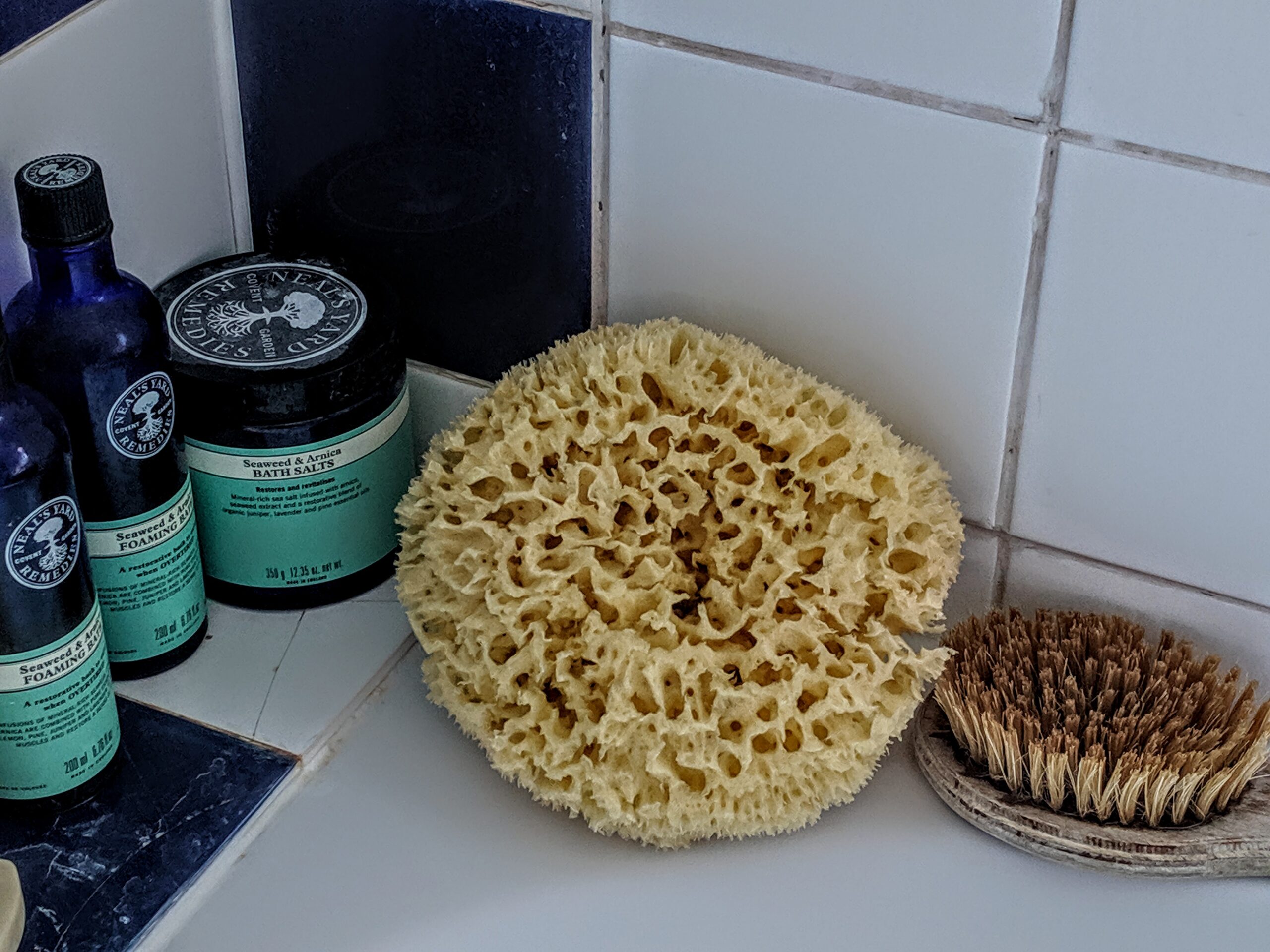
Neal’s Yard remedies, natural sponges and back scrubber 
Bliss
Bath
by AMY LOWELL
The day is fresh-washed and fair, and there is a smell of tulips and narcissus in the air.
The sunshine pours in at the bath-room window and bores through the water in the bath-tub in lathes and planes of greenish-white. It cleaves the water into flaws like a jewel, and cracks it to bright light.
Little spots of sunshine lie on the surface of the water and dance, dance, and their reflections wobble deliciously over the ceiling; a stir of my finger sets them whirring, reeling. I move a foot and the planes of light in the water jar. I lie back and laugh, and let the green-white water, the sun-flawed beryl water, flow over me. The day is almost too bright to bear, the green water covers me from the too bright day. I will lie here awhile and play with the water and the sun spots. The sky is blue and high. A crow flaps by the window, and there is a whiff of tulips and narcissus in the air.

